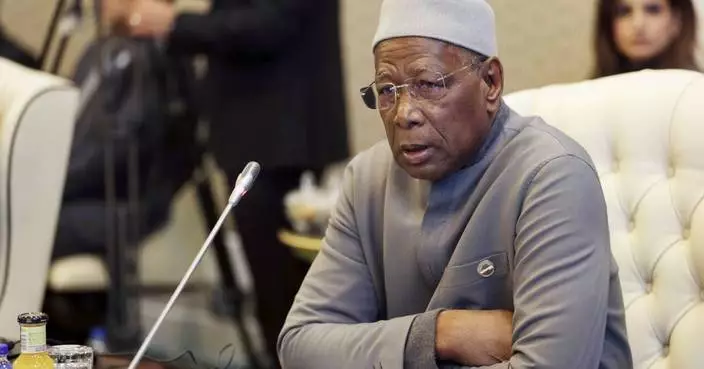The powerful interior minister of Libya’s U.N.-backed government, seen as a contender for the post of prime minister, has expressed hopes that bringing stability to his war-torn country would become a top priority for the incoming Biden administration.
He also announced an upcoming major offensive by Turkey-backed Libyan government forces in the country's west to finish off militants and target human smugglers, and invited the United States to assist.
“Our hopes were greatly lifted” by Joe Biden's election victory, Fathi Bashagha told The Associated Press earlier this week. “We hope that the new administration has a major role in Libya’s stability and reconciliation."
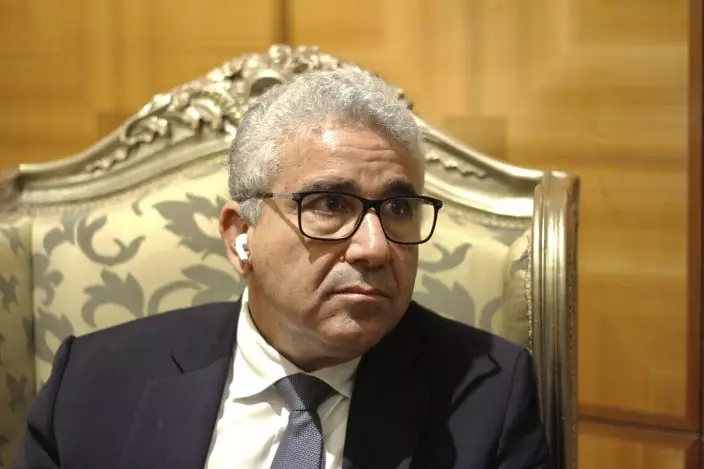
Libya’s UN-supported government’s interior minister Fathi Bashagha is interviewed on Wednesday, Jan. 6, 2021 in Tripoli Libya. Bashagha says he hopes that bringing stability to his war-torn country will become a top priority for the Biden administration. Bashagha also told The Associated Press he would be ready to take on the role of prime minister in a yet-to-be-formed unity government. (AP PhotoHazem Turkia)
Bashagha, a former air-force pilot and businessman, said he would be ready to take on the role of prime minister in a yet-to-be-formed unity government that could follow peace negotiations between Libya's warring sides.
Oil-rich Libya was plunged into chaos after a 2011 NATO-backed uprising toppled and killed longtime dictator Moammar Gadhafi and split the country between the U.N.-supported government in the capital, Tripoli, and rival authorities based in the east. Each side is backed by an array of local militias as well as regional and foreign powers.
Since last year, the two sides have been holding U.N.-led talks to name an interim government before elections later in 2021, but have so far failed to agree on a voting mechanism to do so. Bashagha’s name was floated as a candidate for premier, observers of the talks say.
In October, the warring sides agreed to a cease-fire, which raised expectations of a peaceful resolution, and said that foreign fighters would leave Libya.
Bashagha, who spoke to the AP over the phone from Tripoli, said the withdrawal of foreign forces would be gradual. The rival east-based authorities have been bolstered by Russian mercenaries, while Turkey sent its own troops, Syrian mercenaries and drones to shore up the Tripoli-based government. The minister said he’d told Russia, which along with Turkey is eyeing contracts worth billions of dollars, that Libya is prepared to talk business if the mercenaries leave.
Bashaga also credited U.S. efforts in helping defeat Islamic State militants in the coastal city of Sirte in 2016. In 2019, the U.S. said its airstrikes in southern Libya killed dozens of members of the local IS affiliate. Bashagha says cooperation with the U.S. is ongoing.
But he warned that extremists regained a foothold during an attempt by east-based Libyan commander Khalifa Hifter to capture Tripoli. Hifter’s forces have also targeted IS militants in their strongholds and last year said they killed the top IS figure in Libya.
Bashaga said he hoped the U.S. would back the upcoming operation in the west. Turkey has already pledged support, he said. “We hope the U.S. will assist us ... to finish off terrorist elements that have infiltrated Libya.”
The Trump administration's position on Libya has at times been confusing. The U.S. State Department condemned Hifter's push on Tripoli, but then Trump also made a phone call to Hifter, praising him on fighting terrorism. The administration later repeatedly spoke out against the Russian mercenaries employed by Hifter, who is also backed by Egypt and the United Arab Emirates.
Since becoming interior minister in 2018, Bashagha has positioned himself as one of the most powerful figures in western Libya. He cultivated ties with France and the U.S., as well as Egypt, Turkey and Russia — his nominal rivals in the conflict. Last month in Tripoli, he hosted a foreign ministry and senior intelligence delegation from Egypt, another key backer of Hifter.
But his ministry has also struggled to control the patchwork of militias that hold sway in Tripoli and western Libya. Bashagha said he plans to tackle the problem by identifying militias that should be disarmed and those that could be assimilated into the security apparatus. But he said he has faced problems in implementing the plan, alleging that some militias are allied with other Tripoli officials and control some institutions, such as the intelligence apparatus.
Libya has been plagued by corruption under Ghadhafi and in the tumultuous years that have followed his ouster. “The problem is that some of the parts, institutions of the state provide support to these militias,” Bashagha said.
The U.N.-backed government remains heavily dependent on the militias to battle its eastern rivals. But the militias are not easily controlled and though they, with Turkish support, beat back Hifter’s year-long offensive on Tripoli, some have also been responsible for kidnappings, infighting and civilian casualties.
For its part, the Tripoli government has faced criticism for its handling the thousands of migrants who transit through Libya, attempting to cross the Mediterranean Sea in to Europe.
A 2019 AP investigation found that militias in western Libya torture, extort and otherwise abuse migrants for ransom in detention centers, often under the U.N.'s nose and in compounds that receive millions in European money. Conditions for migrants remain dangerous in Tripoli, according to rights groups and the U.N.
Bashagha said he had closed down illegal shelters and was working with the U.N. to monitor conditions in the remaining ones, but that more funds are needed to maintain them. He also pointed to the arrest in October of Abdel-Rahman Milad, one of the country’s most wanted human traffickers, two years after the U.N. levelled sanctions against him.
He said his new operation in the country’s west would also target migrant smugglers and could help address the root of the problem.
“The security and stability of Libya is important for Europe and the U.S.,” Bashagha said.
Forced to hide her true self, Joe Horras’ transgender daughter struggled with depression and anxiety until three years ago, when she began to take medication to block the onset of puberty. The gender-affirming treatment helped the now-16-year-old find happiness again, her father said.
A decision by the U.S. Supreme Court late Monday allowing Idaho to enforce its ban on such care for minors could jeopardize her wellbeing once again. Horras is scrambling to figure out next steps and is considering leaving Idaho, where he's lived his whole life, to move to another state.
"It would be devastating for her," Horras, who lives in Boise, told The Associated Press. “If she doesn’t have access to that, it will damage her mental health."
Horras is among the Idaho parents desperate to find solutions after their trans children lost access to the gender-affirming care they were receiving. The U.S. Supreme Court's decision allows the state to put in place a 2023 law that subjects physicians to up to 10 years in prison if they provide hormones, puberty blockers or other gender-affirming care to people under age 18. A federal judge in Idaho had previously blocked the law in its entirety.
The ruling will hold while lawsuits against the law proceed through the lower courts, although the two transgender teens who sued to challenge the law will still be able to obtain care.
At least 24 states have adopted bans on gender-affirming care for minors in recent years, and most of them face legal challenges. Twenty of those states besides Idaho are currently enforcing the bans.
Monday’s ruling was the first time the U.S. Supreme Court waded into the issue. The court’s 6-3 ruling steered clear of whether the ban itself is constitutional. Instead, the justices went deep into whether it’s appropriate to put enforcement of a law on hold for everyone, or just those who sue over it, while it works its way through the courts.
In his concurring opinion, Justice Neil Gorsuch said “lower courts would be wise to take heed” and limit use of “universal injunctions” blocking all enforcement of laws that face legal challenges. In a dissent, Justice Ketanji Brown Jackson said the court should not decide the fate of those actions without reading legal briefs and hearing arguments on the issue.
Rights groups in Idaho are supporting families to make sure they're aware the measure has taken effect. The American Civil Liberties Union of Idaho said it plans to hold a virtual event over Zoom with licensed counselors and legal experts to help people process the shock and answer any questions they may have about the law.
“Yesterday was really just an outpouring of fear, questions, people trying to figure out how this is going to affect them personally,” said Jenna Damron, the group's advocacy fellow. “Getting information out quickly that is accurate is kind of our first priority.”
Paul Southwick, legal director for ACLU of Idaho, said the group wants families to know what their options are.
“Gender-affirming medical care is now immediately illegal for minors in the state of Idaho. However, care remains legal for adults, and it’s also legal for minors to seek gender-affirming medical care out of state,” he said.
In Boise, Horras' 16-year-old daughter wears an estrogen patch and receives estrogen injections every six months. Her last shot was in December and Horras now has two months to find a new out-of-state provider who can continue administering the medication. The situation has left him feeling scared, he said, and angry toward the state politicians who passed the law last year.
“It's cruel,” he said.
Advocates, meanwhile, worry that lower-income families won't be able to afford to travel across state lines for care. Arya Shae Walker, a transgender man and activist in the small city of Twin Falls in rural southern Idaho, said he was concerned that people would alter the doses of their current prescriptions in order to make them last longer. His advocacy group has already taken down information on its website on gender-affirming care providers for young people in the area out of concern of potential legal consequences.
The broader issue of bans on gender-affirming care for minors could eventually be before the U.S. Supreme Court again. Last year, a ban on gender-affirming care for minors in Arkansas was shot down by a federal judge, while those in Kentucky and Tennessee were allowed to be enforced by an appeals court after being put on hold by lower-court judges. Montana’s law is not being enforced because of a ruling from a state judge.
Laws barring transgender youth from playing on sports teams that align with their gender identity are also being challenged across the country. An appeals court on Tuesday ruled that West Virginia’s transgender sports ban violates the rights of a teen athlete under Title IX, the federal civil rights law that prohibits sex-based discrimination in schools. Hours later, an Ohio law that bars transgender girls from girls scholastic sports competitions was put on hold by a judge. Set to take effect next week, the law also bans gender-affirming care for transgender youth.
Those who support the bans say they want to protect children and have concerns about the treatments themselves.
Gender-affirming care for youth is supported by major medical organizations, including the American Medical Association, the American Academy of Pediatrics and the American Psychiatric Association. However, England is limiting the ability of people younger than 16 to begin a medical gender transition.
The National Health Service England recently cemented a policy first issued on an interim basis almost a year ago that sets a minimum age at which puberty blockers can be started, along with other requirements. NHS England says there is not enough evidence about their long-term effects, including “sexual, cognitive or broader developmental outcomes.”
Medical professionals define gender dysphoria as psychological distress experienced by those whose gender expression does not match their gender identity. Experts say gender-affirming therapy can lead to lower rates of depression, suicidal thoughts and suicide attempts among transgender people.
Chelsea Gaona-Lincoln, executive director of Idaho-based advocacy group Add The Words, said she's anticipating “a pretty horrendous ripple effect.” But seeing her community uniting in support has given her a glimmer of hope.
“There are people coming together, and it’s so important, for especially our youth, to feel seen and affirmed as they are," she said.
Southwick, the legal director of ACLU of Idaho, said the 9th U.S. Circuit Court of Appeals is expected to hold a hearing this summer on its lawsuit challenging the law.
Associated Press writer Geoff Mulvihill in Cherry Hill, New Jersey, contributed.
This story was first published on April 16, 2024. It was updated on April 18, 2024, to make clear that the 20 states enforcing bans on gender-affirming care for minors are in addition to Idaho and all are among the 24 that have passed laws imposing the bans.
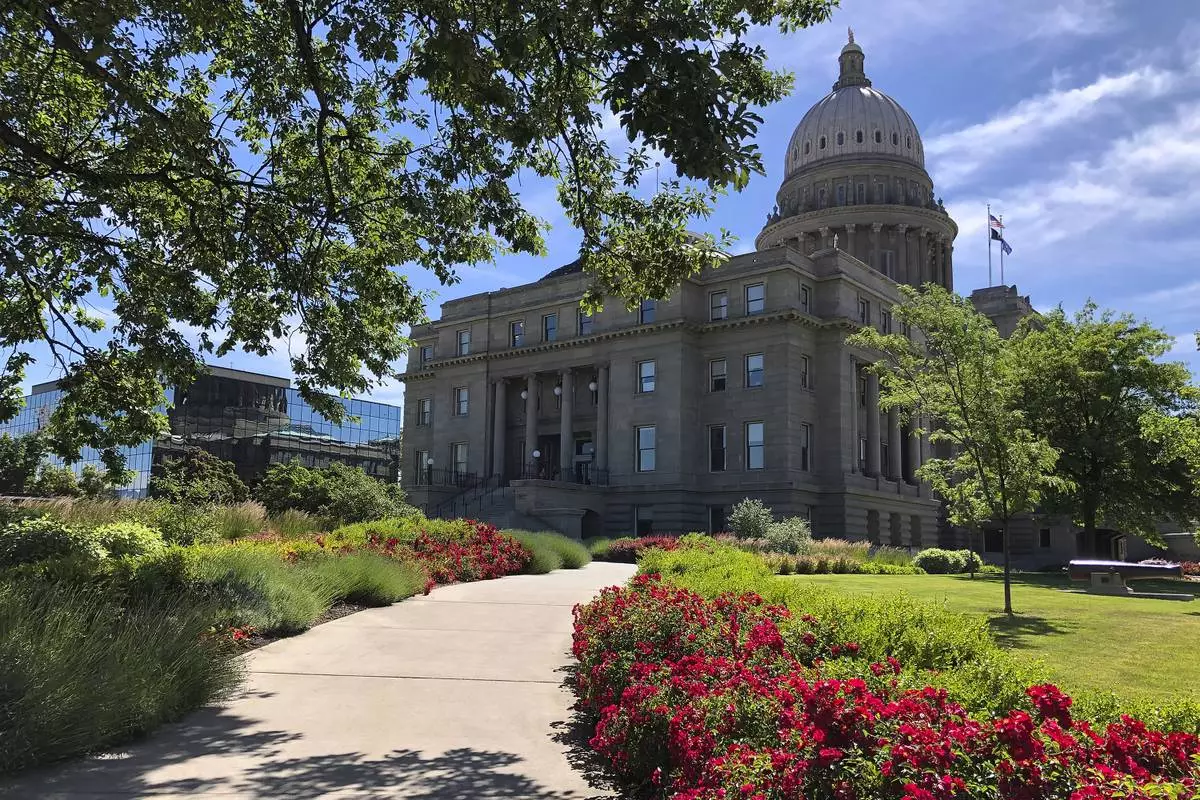
FILE - The Idaho State Capitol in Boise, Idaho, is seen on June 13, 2019. The U.S. Supreme Court's decision on Monday, April 15, 2024, allows the state to put in place a 2023 law that subjects physicians to up to 10 years in prison if they provide hormones, puberty blockers or other gender-affirming care to people under age 18. A federal judge in Idaho had previously blocked the law in its entirety. (AP Photo/Keith Ridler, File)
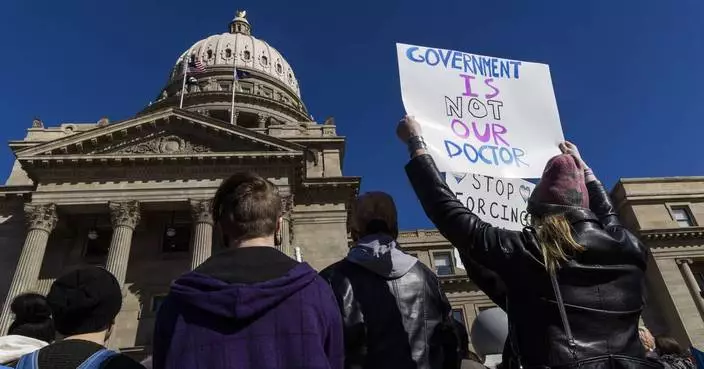
Idaho's ban on youth gender-affirming care has families desperately scrambling for solutions
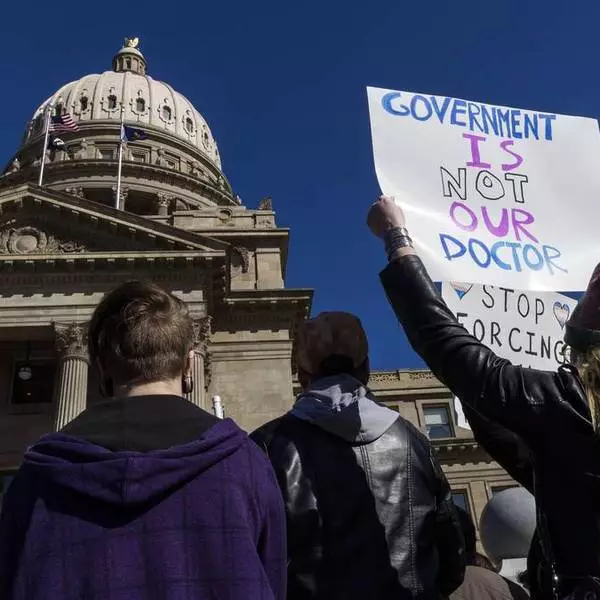
Idaho's ban on youth gender-affirming care has families desperately scrambling for solutions
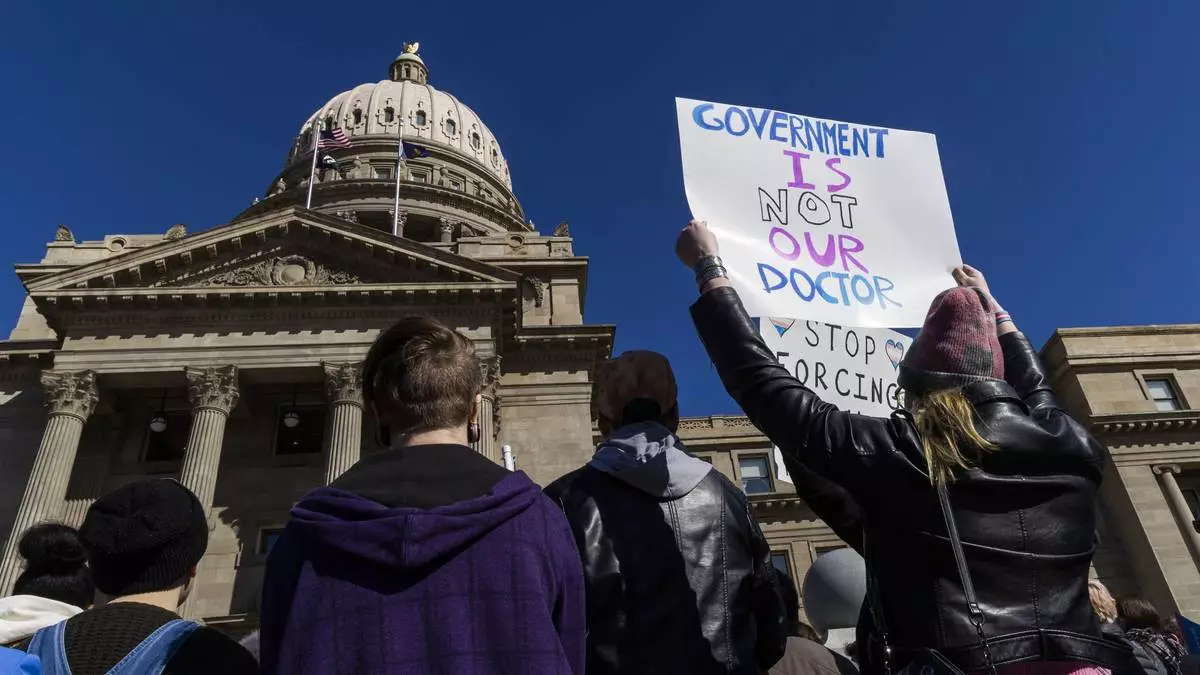
FILE - People gather in front of the Idaho Statehouse in opposition to anti-transgender legislation moving through an Idaho Republican congress, Friday, Feb. 24, 2023, in Boise, Idaho. The U.S. Supreme Court's decision on Monday, April 15, 2024, allows the state to put in place a 2023 law that subjects physicians to up to 10 years in prison if they provide hormones, puberty blockers or other gender-affirming care to people under age 18. A federal judge in Idaho had previously blocked the law in its entirety. (Darin Oswald/Idaho Statesman via AP, File)








